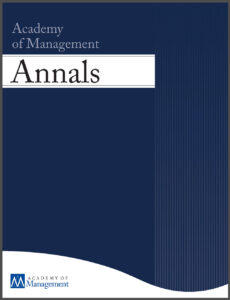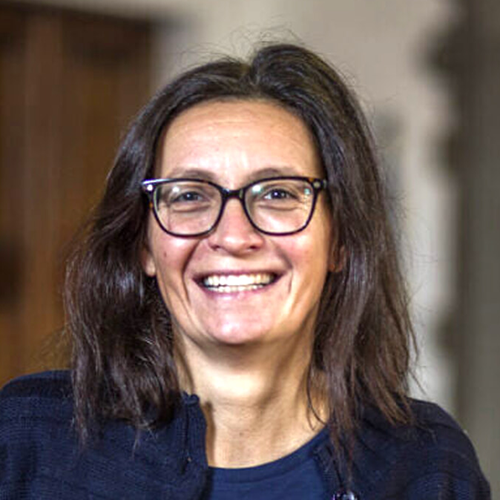Academy of Management Annals

Editorial Team
-

Gary A. Ballinger
Gary A. Ballinger is the Richard D. Wood Bicentennial Professor of Commerce at The University of Virginia’s McIntire School of Commerce. In his research, he focuses on factors that impact the operation of social exchange and trust relationships in the work context. This research investigates questions that touch on research questions in corporate governance, leadership succession, social networks and employee turnover. He has published in Academy of Management Review, Leadership Quarterly, Journal of Applied Psychology, Journal of Management, Personnel Psychology, Organizational Behavior and Human Decision Processes, and Strategic Management Journal.
From 2019 to 2024 he served as an Associate Editor for Academy of Management Annals. From 2014 to 2017 he served as an Associate Editor for Academy of Management Review. He has been or is currently a member of the editorial review boards of Academy of Management Review, Journal of Applied Psychology, Journal of Organizational Behavior, and Organization Science and has reviewed for a number of other journals in organizational behavior and strategic management. He is a member of the Managerial and Organizational Cognition, Organizational Behavior, and Research Methods divisions of the Academy of Management.
Professor Ballinger currently teaches undergraduate courses in organizational behavior. In 2023 he was named as one of Poets & Quants 50 outstanding undergraduate business professors and in 2013 he won an All-University Teaching Award from The University of Virginia. He earned his Ph.D. in Organizational Behavior and Human Resources Management from Purdue University’s Krannert Graduate School of Management in 2004.
-

Cristina Gibson
Cristina B. Gibson is University Professor and Dean’s Distinguished Professor of Management at Pepperdine University. She works at the nexus of organizational science, international management, and cross-cultural psychology to increase employee dignity, well-being, social impact, and organizational effectiveness.
Cristina focuses on inclusion, technology-enabled innovation, and corporate-community partnerships. Her research gives voice to those with differing approaches, perspectives and knowledge, celebrating and bridging differences. Her passions include helping executives, managers, and employees develop skills for culturally diverse collaboration, working remotely and navigating digital transformation. She has developed both theory and practice to improve global communication through technology.
Cristina’s scientific impact was acknowledged in a Stanford University study as among the top 2% of 7 million scientists across scientific disciplines worldwide. She was the recipient of the 2023 Academy of Management Fellows Award for Responsible Research, the 2022 Academy of Management Mentorship Award, the 2019 Medal for Scholarly Contributions by the Academy of International Business and the Decade Award from the Journal of International Business Studies. In 2018, she received the Humanitarian Impact Award from the American Psychological Association. She is a Fellow of the Academy of Management, Academy of International Business, American Psychological Association, and Academy of Social Science Australia.
Cristina served as Chair of the Organizational Behavior Division of the Academy of Management and in the 5-year executive track. She has served as an Associate Editor at Academy of Management Annals, Academy of Management Review, and Organization Science and has reviewed for a broad range of journals in organization, management and psychology.
-

Jonathan Bundy
Professor Jonathan Bundy’s research takes a behavioral approach to strategic management and focuses on the social and cognitive forces that shape organizational outcomes and behavior. He specifically investigates crisis and impression management, corporate reputation and other social evaluations, firm-stakeholder relationships, and corporate governance. His work has appeared in field-leading journals, including the Academy of Management Annals, Academy of Management Journal, Academy of Management Review, Administrative Science Quarterly, Journal of Management, Organization Science, Personnel Psychology, and Strategic Management Journal.
He received his bachelor’s and master’s degrees from the University of New Mexico and his doctorate in strategic management and organization theory from the University of Georgia.
Professor Bundy has been commended for his contributions to research, most recently winning the Emerging Scholar Award from the Strategic Management Society (2021). He has also been awarded the ASQ Award for Scholarly Contribution (2019) in addition to winning multiple reviewer awards for his service to various journals and conferences.
He recently completed a three-year term as an Associate Editor at Academy of Management Review. He also serves as an International Research Fellow with the Oxford University Centre for Corporate Reputation.
-

Gokhan Ertug
Gokhan Ertug (PhD, 2008, INSEAD) is Lee Kong Chian Professor of Strategic Management at the Lee Kong Chian School of Business at Singapore Management University. His research interests span social networks, status, trust, and organization theory more generally, as well as a narrower set of topics in international business. His work has appeared in journals such as Academy of Management Journal, Academy of Management Annals, Administrative Science Quarterly, Journal of International Business Studies, Journal of Management, Organization Science, and Strategic Management Journal. Gokhan has previously served as an Associate Editor at the Academy of Management Journal and Journal of Management, and is currently a Deputy Editor at Organization Science. He has been a guest editor for special issues of Business & Society (on business and society in the age of COVID-19), the Journal of International Business Studies (on social networks), Journal of Management (on invisible inequalities in the workplace), and Journal of Management Studies (on social evaluations in a complex and evolving world).
-

Marylene Gagne
Marylène Gagné is a John Curtin Distinguished Professor at the Future of Work Institute at Curtin University, Perth, Australia. Marylène’s research examines how organizations, through their structures, cultures, rewards, tasks, and management, affect people’s motivational orientations towards their work, including volunteer work, and how the quality of motivation influences performance and well-being in the workplace. She is a Fellow of the Society for Industrial and Organizational Psychology and of the Academy of Social Sciences Australia. She is also a member of the Australian Research Council’s College of Experts.
-

Jennifer Gibbs
Jennifer L. Gibbs (PhD, University of Southern California) is Professor of Communication at the University of California, Santa Barbara, with affiliated appointments in the Technology Management Program (TMP) and the Center for Information Technology and Society (CITS). She studies collaboration in global teams and other remote, distributed, and hybrid work arrangements and implications for the future of work. In addition, her research examines the ways in which new technologies such as digital media and artificial intelligence are transforming organizations and strategic communication practices. She recently co-authored two books (Distracted: Staying Connected without Losing Focus and Organizing Inclusion), as well as publishing over 75 peer-reviewed journal articles and book chapters in a variety of disciplines. Professor Gibbs is a Fellow of the International Communication Association, as well as former editor of Communication Research and past chair of the CTO division of the Academy of Management. She also provides consulting and training to multinational organizations and tech companies on managing global and remote work and has been quoted extensively in the media on her research findings.
-

Elisa Giuliani
Elisa Giuliani (PhD 2002, University of Pisa; PhD 2005, SPRU, University of Sussex) is a Professor of Management at the University of Pisa, Department of Economics and Management, where she is founder and director of the Responsible Management Research Center. Her research examines how firms shape societal well-being, with particular attention to innovation, human rights, inequality, democracy, and international business.
Her work has appeared in top-tier journals including Research Policy, Journal of Management Studies, Journal of Economic Geography, Business & Society, and Journal of International Business Studies. She is Editor of Research Policy and serves on the editorial boards of the Journal of Economic Geography, Economic Geography, and the Business and Human Rights Journal. She is also listed among the top 2% of most-cited scientists worldwide in the Elsevier/Stanford ranking.
She has held research and visiting positions at leading institutions including the European University Institute, CIRCLE Lund University, MIT Sloan School of Management, and Bocconi University. -

Terri L Griffith
Terri L. Griffith holds the Keith Beedie Chair in Innovation and Entrepreneurship at Simon Fraser University’s Beedie School of Business. Her research addresses how individuals and groups design, understand, and use new technologies in their work. Her most recent work (funded by SSHRC), uses large-scale methods to take a “bottom-up” approach to automation and the future of work, including artificial intelligence.
Professor Griffith has served as a senior editor for Organization Science and as an associate editor for MIS Quarterly. She is co-editing upcoming special issues of Organization Science (Remote and Hybrid Work) and Small Group Research (Artificial Intelligence and Groups). Her research appears in journals such as Academy of Management Review, Information Systems Research, MIS Quarterly, Organization Science, and the Journal of Organizational Design, where her co-authored work won the 2024 Organizational Design Community-Accenture Annual Prize for Best Practice-oriented Paper.
She spent two decades in the Silicon Valley and was recognized by the Silicon Valley Business Journal as a Woman of Influence following the publication of her book, The Plugged-In Manager (Wiley, 2011). She was the 2022 President of ISSIP (The International Society of Service Innovation Professionals) and currently serves on the New Ventures BC Society Board of Directors and the advisory board of Geopogo. Her earlier service includes representative-at-large positions for the Academy’s CTO (then OCIS) and TIM divisions. She received her master’s degree and doctorate from Carnegie Mellon University and her bachelor’s degree from University of California, Berkeley, ICD.D, Institute of Corporate Directors-Rotman Directors Education Program.
-

Morela Hernandez
Dr. Morela Hernandez is the Ligia Ramirez de Reynolds Collegiate Chaired Professor at the University of Michigan’s Gerald R. Ford School of Public Policy and Stephen M. Ross School of Business. She is an internationally recognized scholar with deep expertise in applying behavioral science insights to design and improve organizational systems and decision-making practices. Professor Hernandez is widely published in top-tier academic journals and popular media outlets. She is on several editorial boards including Academy of Management Journal and Journal of Applied Psychology, served as Associate Editor for Academy of Management Review, and is a frequent contributor to MIT Sloan Management Review. At the University of Michigan, she teaches courses on leadership and serves as Faculty Director of the Ford School’s Leadership Initiative. She has worked as a leadership development coach for senior-level executives throughout her career, and consults with a number of government agencies, social profit organizations, and global companies on topics related to leadership, diversity and inclusion, as well as large-scale organizational change.
-

Leigh Anne Liu
Leigh Anne Liu is Professor and Director of the Institute of International Business, and the Connie D. and Ken McDaniel WomenLead Chair at Robinson College of Business, Georgia State University. She studies how culture and cognition influence intercultural interactions, including negotiation, conflict management, and collaborations at individual, organizational, and national levels. Her research appears in Administrative Science Quarterly, Journal of Applied Psychology, and Journal of International Business Studies, among other outlets. Her research teams have received grants from the World Health Organization, the U.S. Department of Education, the Research Grants Council of Hong Kong, and the European Commission. Leigh Anne was awarded the Fulbright-Hanken Distinguished Chair in Business and Economics by the U.S. Department of State, Fulbright Foreign Scholarship Board, and Fulbright Finland Foundation. She has been a visiting professor at universities in Australia, China, Finland, and France. She has taught courses and workshops for undergraduate, MBA, MIB, PhD, executives, and high school students on topics of international negotiation, intercultural competency, cross-cultural management, and research methods. She consulted for Fortune 500 companies and the non-profit sector on conflict management and multicultural competency programs. She has served as an associate editor for Journal of Business Research and Cross Cultural & Strategic Management, a guest editor of three special issues, and the editorial boards of Journal of International Business Studies, Academy of Management Review, Management and Organization Review, and International Business Review.
-

Vijaya Venkataramani
Vijaya Venkataramani is Dean’s Professor of Leadership and Innovation at the Robert H. Smith School of Business at the University of Maryland. Her research focuses on creativity and innovation in organizations, especially understanding how informal social relationships and social networks at work enable employees’ abilities to develop and implement creative ideas. Her recent research has focused on exploring why, although employees may have new ideas, these ideas often go unheard, unrecognized, or even prematurely rejected by their managers, and how both employees and managers can address this. Her research has appeared in such journals as the Academy of Management Journal, Organization Science, Journal of Applied Psychology, Personnel Psychology, and Organizational Behavior and Human Decision Processes. She is a former Associate Editor at the Journal of Applied Psychology and serves on the editorial boards of Academy of Management Journal, Organization Science, and Journal of Applied Psychology.
Vijaya received her PhD in organizational behavior and human resources from the Krannert Graduate School of Management, Purdue University in 2008. Prior to her doctoral studies, she completed her MBA and worked in India as a human resources manager. She is an award-winning researcher and teacher and the recipient of the Distinguished Scholar Teacher Award from the University of Maryland.
-

Andrew V. Shipilov
Andrew Shipilov (PhD 2005, University of Toronto, Rotman School of Management) is a Professor of Strategy and the John H. Loudon Chaired Professor of International Management at INSEAD. His research examines how individuals and organizations work together in networks, alliances, and ecosystems. His work appeared in many top research journals, such as Organization Science, Academy of Management Journal, Administrative Science Quarterly, Strategic Management Journal, Journal of International Business Studies, Social Networks, Strategic Organization, and in the Academy of Management Annals. He also regularly publishes in practitioner journals, such as Harvard Business Review and MIT Sloan Management Review. Andrew is a co-author of a book Network Advantage: How to Unlock Value from Your Alliances and Partnerships (Wiley, 2013). He served for six years as Associate Editor of Strategic Management Journal and co-edited special issues in SMJ as well as in the Academy of Management Journal. At INSEAD, Andrew founded a Network Evolution Conference in 2008, which has been gathering researchers interested in studying inter-personal and inter-organizational networks. He also was a co-organizer of the SMS Annual Conference in Paris in 2018.
-

Weilei Shi
Shi Weilei (Stone) is a Professor of Strategy at the Cheung Kong Graduate School of Business (CKGSB) in China. Dr. Shi graduated from the Katz School of Business, University of Pittsburgh with a PhD in Strategic Management in 2008. Currently, he is a Consulting Editor at the Journal of Management Studies, an Associate Editor at Academy of Management Annals, and a Senior Editor at the Asia Management. He is also a distinguished researcher at the Shanghai Institute for Global City–Shanghai Municipal Government Decision Committee. Before joining CKGSB, Dr. Shi was a tenured Professor of Strategy at the Zicklin School of Business, Baruch College in New York. He was also the Associate Editor of Journal of Management Studies from 2018–2024. His research centers on the interaction between strategy and international management. Specifically, he is interested in examining M&As and alliances from both temporal and network perspectives. He is also an expert in the area of digital transformation strategy and ESG investment. His papers have been published in top-tier journals such as Strategic Management Journal, Journal of International Business Studies, Journal of Management, Journal of Management Studies, Organization Studies, Academy of Management Perspective, and Harvard Business Review. He is considered a thought leader in the area of M&As and international strategy. Dr. Shi worked for Roland Berger Strategy Consultancy—a top-notch global strategy consulting firm before he entered academia. Currently, Dr. Shi is an entrepreneur advisor for top-tier incubators and he also sits on the board of multiple listed companies as an independent director.
Managing Editor
-

Stacey Victor
Stacey Victor’s career in publishing has spanned 25 years, beginning in trade publishing at both Time Warner and Random House, and then segueing into the academic and reference world in 2007. Stacey joined AOM in early 2016, where she is Managing Editor for Academy of Management Learning and Education and Academy of Management Annals.
AOM Journals
AOM Publications
